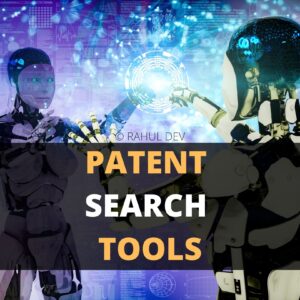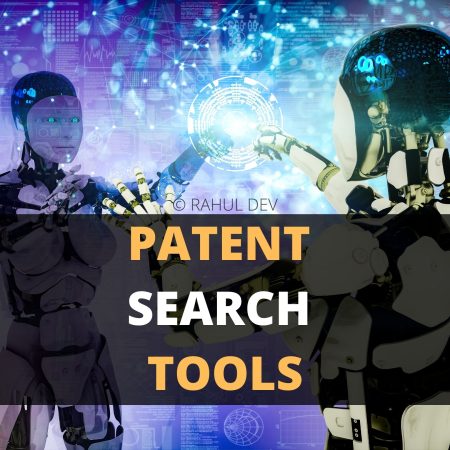Patent Search Tools
Explore Patent Search Tools for Best Practices While Conducting Patent Searches

Trust, Convenience and Innovation
Understand how you can use efficient patent search tools

Explore Patent Search Tools for Best Practices While Conducting Patent Searches

Understand how you can use efficient patent search tools

Protect your innovations across multiple countries and create strong patent portfolio to boost business valuation
Local and global brand protection through international trademark registrations
Extensive research and business writing for technical whitepapers and B2B content products
Inventors elevate their patent search process by using few important patent search tools. At the time of filing a patent application, it really helps the inventors to discover essential patent search tools to elevate the invention protection process by preparing a strong patent application. Generally, patent search tools and patent research tools are invaluable resources for inventors, entrepreneurs, researchers, and really anyone interested in global innovation protection through international patent filing. Online patent search tools and patent search engines make searching patent databases far more accessible compared to having to schedule time at a library. Therefore, patent attorneys and inventors spend countless hours exploring various online patent search tools and patent search databases like the United States Patent and Trademark Office database to ensure that the inventions are presented through a truly novel set of patent claims at the time of filing the patent application.
The best way for conducting thorough patent searches is to start with the United States Patent and Trademark Office’s (USPTO) patent search database. Their advanced search functionality allows you to easily scan through over 10 million patents granted since 1976. Key fields like title, abstract, claims and description can be specifically queried to pinpoint relevant results. The Google Patents database provides a more user-friendly interface for patent searching and contains full-text search capability across global patent collections dating back hundreds of years. Its keyword analysis and citation tools help uncover connections between seemingly disparate inventions. For more robust patent analytics and visualization, AI patent search tools like Innography and Thomson Innovation really deliver useful insights to inform patent research strategy and evaluate technological landscapes.
Of course, understanding exactly how to best use patent search tools and run effective patent searches takes practice. Mastering advance search techniques and analyzing results for relevance is an art. But the wealth of information unlocked by patent search engines and patent databases enables the informed inventor. I’m always amazed at how obscure old patents can inspire new thinking and applications. I encourage all innovators to regularly incorporate patent searching into their inventive process using the various patent search tools available online, wherein the insights uncovered may just lead to the next big thing while drafting a strong patent application.
This article covers following topics:
What Exactly is a Patent Search?
Understanding Patent Search Tools
Creating a Comprehensive Patent Search Report

The inventors aim to protect their inventions by filing one or more patent applications, and as a first step, a patent search acts as a cornerstone for success. Understanding the intricacies of the entire patent process and the manifold advantages it offers can be a game-changer for your invention’s success. According to IP Watchdog, the first patent application filed is crucial for the strength of the patent, emphasizing the importance of a thorough patent search.
Also referred to as a patentability search, a patent search is an exhaustive research aimed at determining the uniqueness of an invention. This involves sifting through multiple patent databases to pinpoint any existing patents or patent applications resembling your proposed innovation. As per industry oriented best practices for conducting patent searches, inventors employ specialized patent search tools. These tools allow searches based on various parameters like keywords, patent classification codes, patent numbers, and even inventor names. The United States Patent and Trademark Office (USPTO) recommends a multi-step patent search strategy for conducting a preliminary U.S. patent search, which is a valuable resource for inventors. In use, reliable intellectual property statistics are vital in understanding trends in policy, business, and technology worldwide, as stated by WIPO. These statistics can guide inventors in making informed decisions, thereby increasing the likelihood of patent approval wherein the patent filing process is decided based on the results of the extensive preliminary patent search.
The prime advantage of performing a patent search lies in understanding the uniqueness of your invention. This research helps you to determine if similar patents exist, to avoid redundant efforts. If you encounter similar inventions, you might need to redefine your patent application or adjust your invention. Also, doing a thorough patent search enables you to avoid infringing on existing patents. This helps you sidestep potential legal issues and financial liabilities, an aspect of utmost interest to your position in the C-suite.
In addition, a patent search can be a potent source of valuable market intelligence. It illuminates the latest innovations, trends, and competitors in your field, ensuring you maintain a cutting-edge perspective. The outcome of a patent search can shape your patent application. It assists you in defining the scope of your invention and drafting the claims, making for a more secure and precise application. Informed decisions always have the upper hand. The knowledge gathered from a patent search can help to develop your patent strategy, allowing you to decide where and when to file patent applications optimally. Conducting a patent search is an inextricable part of the invention process that not only protects your creation but also contributes to its success. By employing effective patent search tools and techniques, you garner valuable insights and structure a comprehensive patent search report. This report becomes an essential document in the patent application process, another tool in your executive arsenal. Hence, it is evident that the path to a successful patent application goes through the lanes of a thorough patent search. For those at the helm of innovation, such as yourselves, this information is not just beneficial, but absolutely critical. Additionally, the results of a patent search form the basis of a comprehensive patent search report, a crucial document in the patent application process.
As it is well known, the road to patenting an innovation is paved with its own set of challenges. One of the primary hurdles is confirming the novelty of your idea. Is it truly unique? Or has someone already beaten you to the punch? Well, that’s where patent search tools swoop in to save the day. Patent search tools are like the ultimate treasure maps, designed to make this exploration smoother. They harbour information about patents granted by various global patent offices. Allowing users to scour through this massive data using specific criteria, these tools are a godsend for those on the thrilling journey of invention and innovation.
Considering the rapidly evolving patent landscape, the inventors cannot ignore the importance of novelty in the patent application process. When it comes to patents, the element of uniqueness is of utmost importance as according to patent laws, inventors cannot claim rights on an invention that’s already been patented. Herein lies the main purpose of patent search tools. They assist inventors in identifying patents that closely resemble their invention, helping them gauge if their idea is genuinely unique. These specialized resources are not just directories of patented ideas, but they are more like navigational aids in the ocean of patents.
At its core, a patent search tool is a digital platform that allows users to filter through comprehensive databases of established patents and patent applications. Using specific search parameters like patent number, inventor name, or keywords related to the invention, inventors can quickly identify existing patents with similarities to their own invention.
Advanced features like patent mapping and patent analytics offered by some patent search tools can help inventors conduct a more targeted and comprehensive search. By understanding and utilizing these tools strategically, inventors can gain valuable insights into the existing patent landscape, paving the way for refining their invention and devising an effective patent application strategy.
Just as every invention is unique, the patent search process is not one-size-fits-all. Depending on the stage and nature of your patent search, different tools may be more advantageous. Here are three primary types of patent search tools you should be aware of:
Database Search Tools: These tools help discover existing patents similar to your idea and are especially useful in the initial stage of your patent search.
Classification Search Tools: These tools allow for targeted searches based on classification codes, helping you identify patents within the same technology field.
Image Search Tools: In the case of inventions involving specific designs or configurations, image search tools can prove to be invaluable by enabling searches based on images, diagrams, or drawings.
The best practices to consider while extracting maximum value from the patent search tools include various steps, such as utilizing relevant and specific keywords, leveraging patent classifications for targeted searches, exploring patent families, reviewing cited and citing patents, and subsequently, conducting patent searches using different tools and techniques. Understanding the search results and analyzing them is the next step. This involves identifying relevant patents, analyzing patent claims, considering the legal status of each patent, and evaluating the patentability of your invention.
A patent search report serves as an invaluable guide, summarizing your findings from various search tools. It provides a detailed overview of your patent landscape and helps you strategize your patent application process more effectively. Components of a patent search report typically include an introduction, a detailed description of your search strategy, a summary of search results, analysis, and conclusion. The patent search report offers multiple benefits. It helps you understand the novelty and potential commercial value of your invention, enables fruitful discussions with potential investors and partners, and guides you through the next steps in the patent application process. In the dynamic landscape of patents, understanding and skilfully utilizing patent search tools can be a game-changer.

As a business coach and thought leader, I cannot emphasize enough the importance of innovation, new software patents, mobile apps, and patents for tech companies, startups, and entrepreneurs. The world is rapidly evolving, and staying ahead of the curve is vital for success. Embracing technological advancements such as blockchain and AI can unlock unprecedented opportunities, streamline operations, and propel businesses into the future with competitive valuation via intangible assets.
Click Here for AI Startup Valuation Guide.
For instance, blockchain technology can revolutionize supply chain management and secure data sharing wherein innovative business models are explained to the audience via technical whitepapers, while AI can automate and optimize decision-making processes. Mobile apps are no longer just a luxury; they have become essential tools for engaging customers and offering personalized experiences. Furthermore, securing digital innovation patents is crucial for protecting intellectual property, fostering innovation, and maintaining a competitive edge. By investing in these areas, businesses can position themselves as industry pioneers and pave the way for a prosperous future after thoroughly conducting the due diligence and reviewing the legal opinion letters, which in case of digital assets can assist in determining the tokens as utility assets or coins as utility tokens before listing the assets at an exchange.
Our team of advanced patent attorneys assists clients with patent searches, drafting patent applications, and patent (intellectual property) agreements, including licensing and non-disclosure agreements. Advocate Rahul Dev is a Patent Attorney & International Business Lawyer practicing Technology, Intellectual Property & Corporate Laws. He is reachable at rd (at) patentbusinesslawyer (dot) com & @rdpatentlawyer on Twitter.
Quoted in and contributed to 50+ national & international publications (Bloomberg, FirstPost, SwissInfo, Outlook Money, Yahoo News, Times of India, Economic Times, Business Standard, Quartz, Global Legal Post, International Bar Association, LawAsia, BioSpectrum Asia, Digital News Asia, e27, Leaders Speak, Entrepreneur India, VCCircle, AutoTech).
Regularly invited to speak at international & national platforms (conferences, TV channels, seminars, corporate trainings, government workshops) on technology, patents, business strategy, legal developments, leadership & management.
Working closely with patent attorneys along with international law firms with significant experience with lawyers in Asia Pacific providing services to clients in US and Europe. Flagship services include international patent and trademark filings, patent services in India and global patent consulting services.
Global Blockchain Lawyers (www.GlobalBlockchainLawyers.com) is a digital platform to discuss legal issues, latest technology and legal developments, and applicable laws in the dynamic field of Digital Currency, Blockchain, Bitcoin, Cryptocurrency and raising capital through the sale of tokens or coins (ICO or Initial Coin Offerings).
Blockchain ecosystem in India is evolving at a rapid pace and a proactive legal approach is required by blockchain lawyers in India to understand the complex nature of applicable laws and regulations.